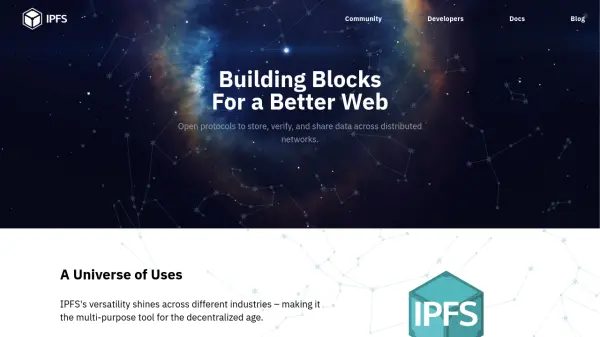What is IPFS?
IPFS (InterPlanetary File System) is an open, distributed protocol that enables decentralized storage, verification, and sharing of digital content across peer-to-peer networks. By utilizing content addressing, IPFS allows data to be located and retrieved based on its unique fingerprint, ensuring data integrity and verifiability regardless of its location.
The protocol is designed to be resilient and censorship-resistant, with files distributed across multiple nodes for enhanced availability and durability. IPFS supports a broad range of use cases, including building offline-native productivity tools, archiving websites, supporting digital art storage, enhancing scientific collaboration, and ensuring transparent data storage in Web3 applications. Its open ecosystem provides robust tooling, documentation, and community support, making it a foundational building block for the next-generation decentralized web.
Features
- Content Addressing: Store and retrieve data using unique content hashes instead of traditional file names or locations.
- Distributed Network: Data is stored across multiple nodes, enabling resilience and enhanced accessibility.
- Verifiable Integrity: All data is verified via hash functions, ensuring authenticity and reliability.
- Open Protocol: Built as an open-source ecosystem, fostering community participation and transparency.
- Multi-Platform Support: Implementations available in Go, Rust, JavaScript, desktop, browser, mobile, and embedded environments.
- Censorship Resistance: Enables sharing of information even under restrictive network conditions.
- Scalable Data Storage: Supports large-scale data storage and compute capabilities for diverse applications.
Use Cases
- Building decentralized productivity and knowledge management tools
- Creating censorship-resistant digital archives and content libraries
- Optimizing asset delivery for gaming and multimedia applications
- Storing and verifying digital art, NFTs, and creative content
- Publishing and collaborating on scientific research data
- Enabling transparent data storage for Web3 projects and DAOs
- Supporting interplanetary data exchange infrastructure
FAQs
-
What is content addressing in IPFS?
Content addressing in IPFS means storing and retrieving data based on the unique hash of its content, rather than its file name or server location. This ensures data integrity and verifiability. -
How does IPFS provide resilience against outages?
IPFS distributes data across multiple network nodes, allowing access to files even if some nodes go offline or experience critical outages. -
Is IPFS suitable for building decentralized applications?
Yes, IPFS supports decentralized application development with multi-platform libraries and robust tooling for developers.
Related Queries
Helpful for people in the following professions
IPFS Uptime Monitor
Average Uptime
99.58%
Average Response Time
372.63 ms
Featured Tools
Join Our Newsletter
Stay updated with the latest AI tools, news, and offers by subscribing to our weekly newsletter.






